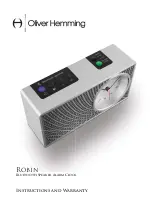
CONNECTION DIAGRAM FOR DETECTOR PART CSA-SGA / CSA-FUV
Alternatively, you may connect up to 5 detectors (mixed CSA-SGA and CSA-FUV) to any single
zone by connecting them as follows. By this method, you may use 1 controller for up to 5 different
zones.
SENSITIVITY ADJUSTMENT FOR CSA-SGA / CSA-FUV
Adjustment for the CSA-SGA is by DIP
switches located on the back of the detector.
Switches 1 & 2 select the sensitivity; switch 3
adds a transient delay and switch 4 is only
used on model CSA-SGA/R to incorporate a
470
Ω
resistor.
Adjustment for the CSA-FUV is by DIP
switches located on the back of the detector.
Switches 1 & 2 select the sensitivity; switch 3
is not used and switch 4 is only used on model
CSA-FUV/R to incorporate a 470
Ω
resistor.
OPERATING FEATURES
On the fascia of the controller, are two red buttons, and a series of lamps that warn of the
specific functions of the controller. The ‘Power’ lamp will flash green once every five seconds to
instruct the user that all is well. Each of the five ‘Zone’ lamps has two colours - Red for Alarm;
Yellow for Fault. In the event of an alarm from a Detector connected to that zone, the lamp will
illuminate Red and a buzzer will sound continuously, indicating the location of the alarm. Pressing
the ‘Silence’ button, followed by the ‘Reset’ button can reset this.
In the event of a zone fault, the specific zone lamp will flash yellow once every five seconds and
the buzzer will beep with each flash. Again pressing the ‘Silence’ button, followed by pressing the
‘Reset’ button can reset this.
The final ‘Fault’ lamp will illuminate to indicate a fault condition with the Controller. The lamp will
flash once every five seconds and the warning buzzer will beep with each flash. In the event that
the ‘Power’ lamp is extinguished, and the ‘Fault’ lamp continues to show fault, this indicates that
the batteries are in a low condition and should be replaced as soon as possible.
Each Cig-Arrête Smoke Detector is fitted with an integral red LED lamp, visible once the Detector
has been installed. Immediately after power up, the LED on each of the Detectors will flash for a
period of two minutes. This indicates that the Detector is learning its environment and as such is
functioning correctly. If an alarm is sensed, the Detector transmits the condition to the controller
and then repeats the two-minute flash period again, thus allowing the location of the alarm to be
visually confirmed. The Detectors will reset themselves automatically once the cause of the alarm
has been removed.
Under normal conditions, a set of batteries should operate for up to 12 months, although this will
be affected by the number of alarms, and the length of the alarm condition being allowed to
remain for a continued period of time.
EXTERNAL POWER SUPPLY (CSA-SMPSU)
The system may be powered from
a 6-Volt D.C. power source, which
may be connected to the external
supply terminals provided on the
terminal block on the controller
back-plate.
In addition, a Remote Alarm
Indicator (part no. CSA-RAI), may
be connected to allow remote
monitoring of the system
controller.
The controller has been fitted with
a selector switch on the back of
the main printed circuit board. The
removal of this jumper will
facilitate the use of a ‘Silent Mode’
of operation, when used in
conjunction with the Remote
Alarm Indicator.
NOTE:
ONCE THE SYSTEM IS POWERED, SHOULD THE BATTERIES OR THE
POWER SUPPLY BE REMOVED, IT IS NECESSARY TO WAIT FIVE MINUTES BEFORE
RE-POWERING THE SYSTEM. FAILURE TO DO SO MAY RESULT IN INACCURATE
OPERATION OF THE SYSTEM.




















